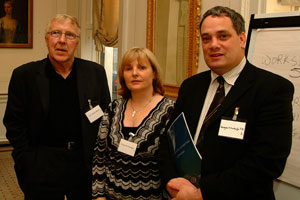6 December 2007 Edition
Battle continues for effective community policing

Sinn Féin Councillors Christy Burke and Críona Ní Dhalaigh and TD Aengus Ó Snodaigh at the Joint Policing Committees consultation meeting
BY AENGUS Ó SNODAIGH TDSinn Féin Justice Spokesperson
Changes to policing across the 26 Counties are in the pipeline for 2008. These changes include further opportunities for critical engagement by Sinn Féin representatives.
Opening a consultation seminar on Thursday, 29 November, evaluating the existing 29 pilot Joint Policing Committees (JPCs), Minister for Justice Brian Lenihan announced his intention to establish a committee in each local authority as early as possible in 2008, thereby increasing the number of JPCs to a total of 114. Lenihan also endorsed the Garda Commissioner’s proposals to change Garda boundaries to achieve a closer alignment between the functional areas of local authorities and Garda Divisional Boundaries (provision for changes outside of Dublin will be made in the Garda Policing Plan 2008).
Lenihan invited a selection of JPC members to participate in the seminar to evaluate the experience of JPCs so as to inform future developments. Councillors Críona Ní Dhalaigh, Christy Burke and myself participated on behalf of Sinn Féin.
The feedback I’ve been receiving from our JPC reps across the state has been mixed. It has ranged from good in Letterkenny to bad in Wicklow and unremarkable in Dublin. But the evaluation of the pilot JPCs offers the Justice Minister a real opportunity to fix the shortcomings experienced thus far. I hope the new year, with the conclusion of this evaluation, will mark an important turning point for community input to policing in this state.
The priorities for JPCs that I focused on during the consultation were the need for public meetings, proper resources and changes to the membership make-up.
Public meetings would provide a crucial mechanism through which people can tie-in directly to the work of the JPCs. They should be a forum for real and meaningful consultation with communities contributing to policy change and action.
Public meetings
On foot of a proposal by the JPC vice-chair, Sinn Féin Councillor Gerry McMonagle, the Letterkenny JPC has hosted two public consultation meetings to which the public, residents’ associations, sporting groups and youth groups were invited. The meetings included a presentation explaining what a JPC is, a Questions & Answers session and roundtable discussions (facilitated by the committee members) on the issues affecting the community in their home, housing estate and town during the day and night and suggestions for solutions.
This type of initiative needs to be happening routinely across all JPCs. In fact, directly consulting the public must be the priority if JPCs are to succeed in instilling community confidence in, and ownership of, strategies to tackle crime and anti-social behaviour.
A major failing of the JPCs has been the lack of resources such as personnel dedicated to promoting the JPC and finances to advertise and hold public meetings. The Government must back up its rhetorical commitment to community policing with money.
Also in the smaller policing fora where public meetings are held and are attended by gardaí and council staff, they are on record as saying they cannot sustain the response to the issues raised at the public meetings.
Section 37 of the Garda Síochána Act would allow for the establishment of a new division in local authorities specifically tasked with combating crime and anti-social behaviour. This division could draw in staff from Housing, Community, Environment and Planning Departments, thereby cutting out internal council blame games. They could also act as executive for the JPCs. These should be introduced.
I also called for guidelines governing membership to be amended to provide for one-third elected reps (cross-party), one-third statutory agencies and one-third community/voluntary.
Lack of community representation
Giving her impression of how the consultation seminar went, Councillor Críona Ní Dhalaigh said she felt the most significant point arising from the workshops was the commonly held view that the JPCs lack adequate community representation. And a proposal to increase the number of community reps was mooted. She said a number of gardaí also expressed their concern that the JPCs were little more than ‘Q&A sessions’ with no real problem-solving focus. They stressed the importance of having effective chairpersons.
Críona brought up the question of funding, stressing that there should be at least one individual funded and tasked with administration for the JPCs solely. The current practice of using existing local authority staff, each with a raft of other responsibilities, was stunting the potential progress to be made by JPCs.
What’s clear from the myriad of experiences is that a lot depends on the existence of political will locally. The JPCs will only be as good as the people who make up their membership – unfortunately, the bulk of this is the Establishment parties who do not desire real change. Therefore it is imperative that the Justice Minister takes action at his level to address the failures outlined by Sinn Féin and we will be chasing him to do so.
However, Lenihan also made it clear that it is the responsibility of each committee to fulfil its responsibilities. So, alongside national initiatives, the battle by our JPC reps for real opportunities to influence policing on behalf of communities must continue at the local level.
